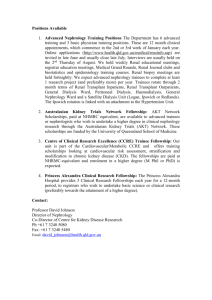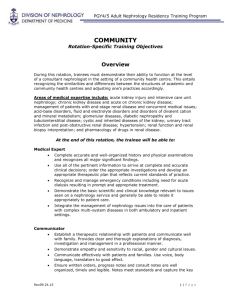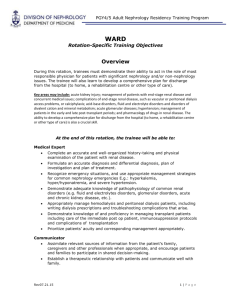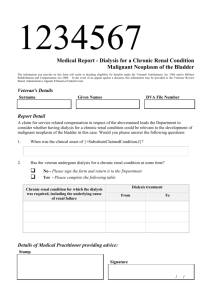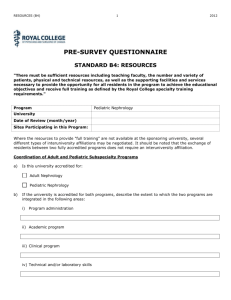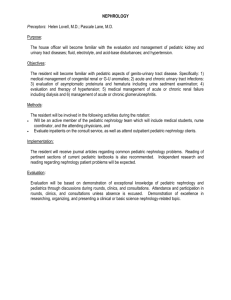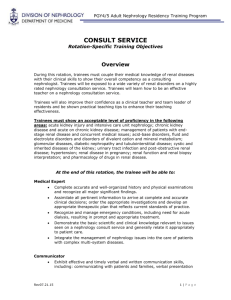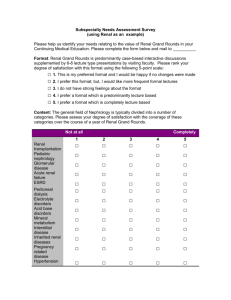Nephrology Goals and Objectives
advertisement
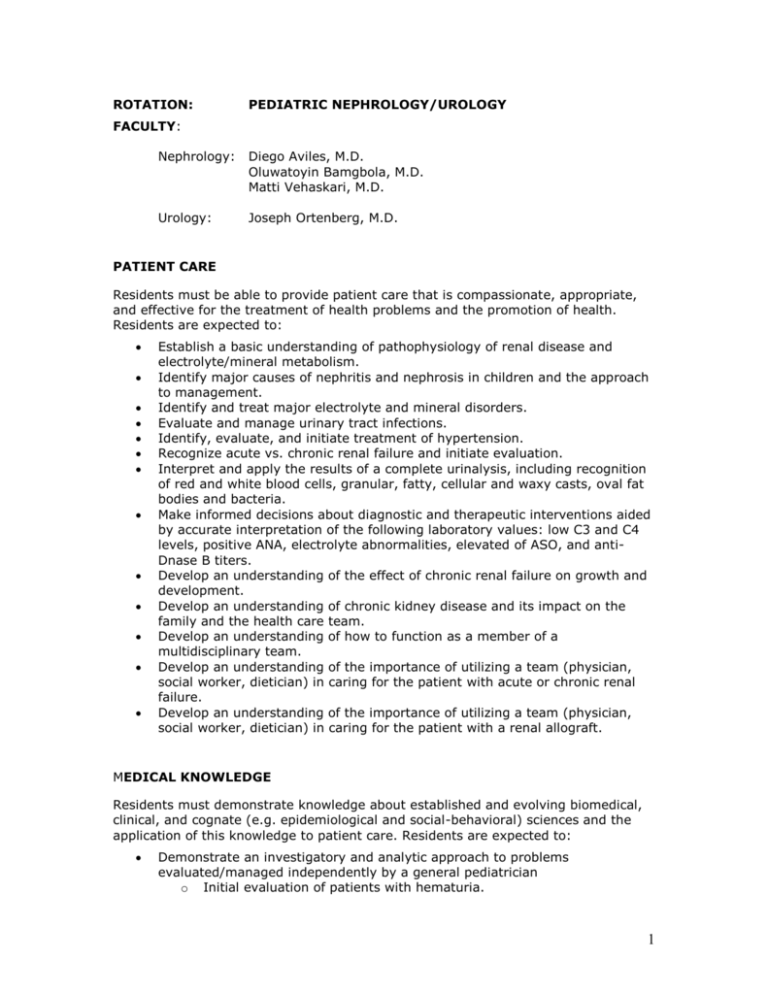
ROTATION: PEDIATRIC NEPHROLOGY/UROLOGY FACULTY: Nephrology: Diego Aviles, M.D. Oluwatoyin Bamgbola, M.D. Matti Vehaskari, M.D. Urology: Joseph Ortenberg, M.D. PATIENT CARE Residents must be able to provide patient care that is compassionate, appropriate, and effective for the treatment of health problems and the promotion of health. Residents are expected to: Establish a basic understanding of pathophysiology of renal disease and electrolyte/mineral metabolism. Identify major causes of nephritis and nephrosis in children and the approach to management. Identify and treat major electrolyte and mineral disorders. Evaluate and manage urinary tract infections. Identify, evaluate, and initiate treatment of hypertension. Recognize acute vs. chronic renal failure and initiate evaluation. Interpret and apply the results of a complete urinalysis, including recognition of red and white blood cells, granular, fatty, cellular and waxy casts, oval fat bodies and bacteria. Make informed decisions about diagnostic and therapeutic interventions aided by accurate interpretation of the following laboratory values: low C3 and C4 levels, positive ANA, electrolyte abnormalities, elevated of ASO, and antiDnase B titers. Develop an understanding of the effect of chronic renal failure on growth and development. Develop an understanding of chronic kidney disease and its impact on the family and the health care team. Develop an understanding of how to function as a member of a multidisciplinary team. Develop an understanding of the importance of utilizing a team (physician, social worker, dietician) in caring for the patient with acute or chronic renal failure. Develop an understanding of the importance of utilizing a team (physician, social worker, dietician) in caring for the patient with a renal allograft. MEDICAL KNOWLEDGE Residents must demonstrate knowledge about established and evolving biomedical, clinical, and cognate (e.g. epidemiological and social-behavioral) sciences and the application of this knowledge to patient care. Residents are expected to: Demonstrate an investigatory and analytic approach to problems evaluated/managed independently by a general pediatrician o Initial evaluation of patients with hematuria. 1 Initial evaluation of patients with proteinuria. Diagnosis and evaluation of patients with a urinary tract infection. Evaluation and management of patients with uncomplicated mild to moderate essential hypertension. o Evaluation and management of dehydration, metabolic acidosis/alkalosis, and imbalances of serum sodium, potassium, calcium, phosphate, and magnesium. Demonstrate an investigatory and analytic approach to problems evaluated/managed by a general pediatrician with nephrology consultation: o Initial evaluation and management of acute renal failure, not requiring dialysis. o Recognition and initial evaluation of chronic renal failure. o Management of essential hypertension complicated by the need for more than one drug, severe elevations of blood pressure, or endorgan damage. o Management of urinary tract infections complicated by frequent recurrences, vesicoureteral reflux, or bladder dysfunction. o Management of uncomplicated (steroid sensitive without frequent relapses) minimal change nephrotic syndrome. Know how to independently manage the following emergencies o Life threatening hyperkalemia o Initial management of severe, acute hypertension o Initial management of life-threatening severe metabolic acidosis o Treatment of vascular collapse (i.e. severe hypotension and poor tissue perfusion) associated with the use of diuretics in patients with nephrotic syndrome Know the role of microangiopathic hemolytic anemia, thrombocytopenia, hematuria, and proteinuria in the diagnosis of hemolytic uremic syndrome. Know the importance of heavy proteinuria, hypoalbuminemia, and hyperlipidemia in the diagnosis of nephrotic syndrome. Know the importance of recognizing and understanding the pathogenesis of hyperphosphatemia, low serum bicarbonate, and normochromic, nomocytic anemia in renal failure. o o o Recognize urine concentrating defects in chronic renal disease. Recognize common urologic problems including circumcision difficulties, epispadias, hypospadias, utereral reflux, urinary tract stones, and hydronephrosis. PRACTICE-BASED LEARNING AND IMPROVEMENT Residents must be able to investigate and evaluate their patient care practices, appraise and assimilate scientific evidence, and improve their patient care practices. Residents are expected to: Attend the weekly divisional clinical nephrology conference. At the end of the rotation, residents are expected to give a topic or caseoriented presentation at the weekly divisional conference utilizing a literature search and agreed upon by residents and attending. 2 INTERPERSONAL AND COMMUNICATION SKILLS Residents must be able to demonstrate interpersonal and communication skills that result in effective information exchange and teaming with patients, their patients families, and professional associates. Residents are expected to: Complete all new nephrology consultations, including examining the patient and reviewing history and labs prior to presenting the patient to the attending nephrologist. Following presentation, the consultation will be written by residents and co-signed by the attending. Write all pertinent orders after discussion with the attending. The nephrology attending will write dialysis orders and be directly responsible to dialysis nursing staff. PROFESSIONALISM Residents must demonstrate a commitment to carrying out professional responsibilities, adherence to ethical principles, and sensitivity to a diverse patient population. Residents are expected to: Attend all pediatric nephrology outpatient clinics at Children’s Hospital. There are approximately 6-15 outpatient visits per each of the three weekly half-day clinics including 1-4 new patients. There are also two monthly peritoneal dialysis clinics with 3-5 patient visits each. Round on the renal inpatients and consult patients and write daily notes, including manangement plans, prior to rounds with the attending physician. Residents are encouraged to keep a flow sheet to facilitate data management. SYSTEMS-BASED PRACTICE Residents must demonstrate an awareness of and responsiveness to the larger context and system of health care and the ability to effectively call on system resources to provide care that is of optimal value. Residents are expected to: Know when to obtain renal/urologic consultations. Develop an understanding of how to function as a member of a multidisciplinary team. Develop an understanding of how a multidisciplinary team provides patient care to the patient and the family. Residents are expected to work with the program’s social worker, dietician, transplant coordinator, and dialysis nurse in order to become familiar with the various aspects of chronic renal cases. Reading Materials (available at the Pediatric Nephrology office at Children’s Hospital): Pediatric Nephrology, Editors M. Holiday, T.M. Barrat, E. Avner. Pediatric Kidney Disease. Editor, C. Edelman. Housestaff ring binder on pediatric nephrology Teaching Files: from the nephrology division, including selected articles pertaining to particular cases, as recommended by the attending nephrologist. 3
